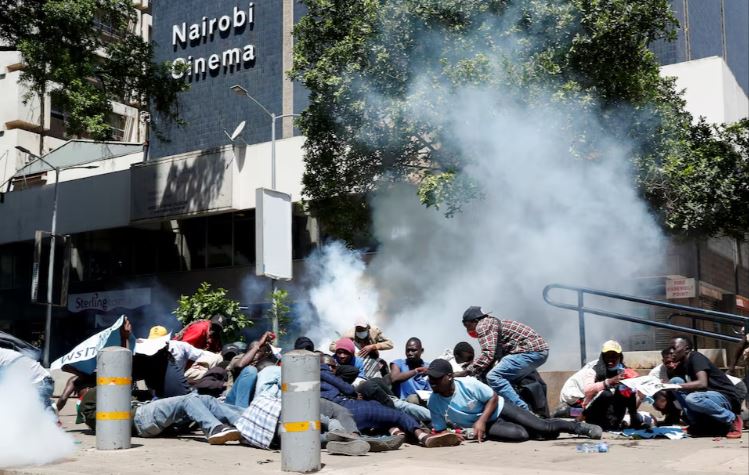How limited access to information places Kenyans on collision path with govt

Law Society of Kenya President Faith Odhiambo noted that the arrest and detention of Mulei at Capitol Hill Police Station is a violation of her rights as the alleged offense of causing a public disturbance is only punishable by a fine or imprisonment for 6 months.
The arrest and detention of 61-year-old patient, Grace Njoki Mulei on Thursday afternoon at Ladnan Hospital in Eastleigh marks yet another instance of Kenyans' calls for accountability being met with harsh government action, reflecting the ongoing decline in the state of human rights in the country."
Mulei was hounded out of the hospital by police officers on January 15 for allegedly causing a disturbance at the Ministry of Health's boardroom when she and another mother angrily stormed a press briefing by CS protesting the Social Health Authority (SHA)'s inefficiencies at the Kenyatta National Hospital. They said they could not access services even after registering and paying their dues.
More To Read
- Kanja, DPP given seven days to produce missing security analyst Mwenda Mbijiwe
- High Court asked to compel State to produce missing security analyst Mwenda Mbijiwe
- 73% of Kenyans believe government not doing enough to stop abductions, extra-judicial killings - TIFA Report
- LSK demands urgent probe into abductions of lawyers, warns of persecution
- 'Muthaiga 3' activists set free after High Court rejects case extension request
- Kenya's Non-NATO status at risk as US Congress probes Ruto administration over extrajudicial killings, Sudan's RSF links
Later the Health CS Deborah Barasa acknowledged that there had been interruptions on January 14 and January 15 caused by the system's downtime thus affecting patient clearance and billing.
"To our patients, we are deeply sorry for the disruption. Your well-being is our priority, and we are working tirelessly to ensure consistent, high-quality healthcare," she said.
Mulei was let go but a week later she was arrested, a trend that is increasingly concerning as Kenyans' demand for accountability is being met with arrests, abductions, and in dire cases enforced disappearances.
This, according to human rights experts reflects a growing lack of government compliance with the Access to Information Act, which gives Kenyans the freedom to demand information, especially about aspects of governance that affect their daily lives.
"This is a petty charge designed to discourage Kenyans from seeking accountability, access to health is a fundamental right which you have violated by arresting her at a hospital," former Presidential Candidate Martha Karua said in a post on X.
Law Society of Kenya President Faith Odhiambo noted that the arrest and detention of Mulei at Capitol Hill Police Station is a violation of her rights as the alleged offense of causing a public disturbance is only punishable by a fine or imprisonment for 6 months.
"Article 49(2) of the Constitution prohibits persons arrested on such claims from being remanded in custody. The actions of the @NPSOfficial_KE and @DCI_Kenya against Grace Mulei offend the constitution, law, and the Police's own standing orders. The @LawSocietyofKe will provide legal support to secure the release of Grace," she said on Friday ahead of Mulei's presentation in court.
Speaking outside Capitol Hill Police Station after the release of Grace Mulei, her lawyer Ndegwa Njiru, revealed that police were unsure of the charges to press against her.
— The Eastleigh Voice (@Eastleighvoice) January 24, 2025
Njiru: They said they would continue with the investigations. This is a botched scheme that's why they… pic.twitter.com/XODR1Yrgwy
Increase in public anger
According to Katiba Institute's Executive Director Nora Mbagathi, these acts by the government are the reason why public agitations are on the increase.
"The country is witnessing a rising demand for information and accountability by citizens from leaders - through public protests, heightened civic oversight over public expenditure, and growing demand to be involved in governance processes. However, this has also been met by increased threats to human rights including enforced disappearances, police brutality, extra judicial killings, arrests, prosecutions, and other forms of repression aimed at restricting public participation and the civic space."
"These public agitations reflect the failure by governments to honour their obligations to among others provide public services effectively and efficiently, meaningfully engaging the people in decision-making, ensuring prudent use of public resources and accountability for human rights violations," she said during an access-to-information training for community leaders, Civil Society Organisations, Nairobi County officials and journalists in Nairobi County.
Access to information is a critical factor for the realisation of fundamental rights and freedoms. As set out under Article 35 the government has the duty 'to publish and publicize any important information affecting the nation' is a standing constitutional obligation.
"Public officials have a duty to provide information proactively and on request; while, as citizens within our respective mandates, we have an oversight role to ensure that these legal obligations are fulfilled and to challenge when there is non-compliance. This includes supporting and protecting conscious citizens (whistleblowers) who disclose information in the interest of the public. Often, it is the courage of these brave citizens that brings important public issues to light," she said as she called on both counties and the national governments to progressively and proactively make information available to all, in fulfilment of the legal obligations to make governance more open and expand the space for meaning citizen participation.
According to the Commission on Administrative Justice aka The Ombudsman, the government is required by law to actively share information that is of public interest with the public via its relevant platforms including information about a project, costs, and procedures and if late to share, it is required to do so when requested by a member of the public as officials only hold it in trust for Kenyans.
Access to information is however limited in instances where there is justification that the release of the information sought undermines national security, endangers lives, promotes warranted invasion of personal privacy, or illegally infringes the commercial interests of an interested party.
It is also limited in instances where it reveals the state's trade secrets. Causes substantial harm to the country's economy, impedes due process in instances of criminal investigations, and in cases where it infringes on professional privileges such as lawyer-client confidentiality.
Oftentimes in Kenya, requests for information are met with harsh reception and the constant question "What do you want the information for? In instances where an unjustifiable request is not honoured within 21 days, Kenyans have the liberty to seek assistance from the Ombudsman.
Similar trainings have been held in collaboration in Turkana, Samburu, and Lamu counties to enhance stakeholders' understanding of ATI laws, ensuring they can navigate and apply these legal frameworks effectively and promote greater accountability and transparency.
Top Stories Today














































